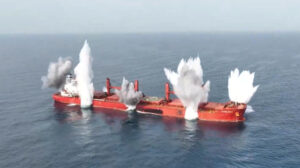Türkiye has strongly reacted to the Maritime Spatial Planning of the European Union. In a statement over the weekend, Türkiye’s Ministry of Foreign Affairs said that it is closely monitoring the European Union’s (EU) Maritime Spatial Planning, conveying the necessary warnings to the relevant parties, and taking all the measures to protect its rights in the Aegean and the Mediterranean.
The European Commission, on its Maritime Spatial Planning (MSP) Platform under Greece’s profile, published a document with a map on Greece’s Maritime Spatial Plan profile based on data sourced from various organizations and national sources.
“The Aegean and the Mediterranean maps used in this Planning are null and void for Türkiye and have no legal effect whatsoever. We reiterate that we will not allow the violation of Türkiye’s rights with this Planning,” noted Türkiye’s Foreign Affairs ministry.
The statement accused the EU of interfering in maritime disputes and warned that such unilateral attempts do not contribute to resolving the “interrelated Aegean issues.”
“We would like to remind that the EU has no authority to comment on maritime disputes between sovereign states. The EU’s involvement in such initiatives makes it more difficult to resolve these disputes.
“Unilateral actions regarding maritime jurisdiction areas are unacceptable. Such unilateral attempts will undermine the efforts to find a comprehensive, just and durable solution to the interrelated Aegean issues,” the ministry added.
“A sincere and comprehensive approach should be adopted to solve the problems on the basis of international law and good neighborliness.”
In 2014, the European Parliament established a framework for maritime spatial planning.
As stated in the directive 2014/89/EU of the European Parliament, “Maritime spatial planning will contribute to the effective management of marine activities and the sustainable use of marine and coastal resources, by creating a framework for consistent, transparent, sustainable and evidence-based decision-making.”
It also said that the main purpose of maritime spatial planning is to promote sustainable development and to identify the utilisation of maritime space for different sea uses as well as to manage spatial uses and conflicts in marine areas.
The European MSP Platform is a service for member states to share relevant knowledge and experiences on Maritime Spatial Planning (MSP).
The European MSP in its website said that Greece has not yet adopted a Maritime Spatial Plan (MSP).
However, Greece has elaborated sectoral Special Frameworks for Spatial Planning (TS Plans) for aquaculture, tourism, industry and renewable energy which include provisions for the coastal and marine segments of each sector.
The European Commission, on its Maritime Spatial Planning (MSP) Platform, clarified that the information contained in the document has been prepared for information purposes only and should not be considered legally binding in any nature. “The illustrative map shown on the cover and on page should not be interpreted as a legal representation of jurisdictional boundaries,” it said.
Earlier this month the Minister of Foreign Affairs Hakan Fidan met with his Greek counterpart George Gerapetritis in Athens.
In the meeting’s top agenda, it was included an assessment of the conditions that must be met in order to launch a substantive discussion on the delimitation of the continental shelf and the Exclusive Economic Zone in the Aegean and the Eastern Mediterranean.
“This is an initial, honest approach to a difficult but critical issue,” the Hellenic Ministry of Foreign Affairs said, adding that the subject will be discussed again in upcoming meetings.
Regarding Maritime Spatial Planning of the European Union https://t.co/v8YPLUX1Q6 pic.twitter.com/XnapvulhMW
— Turkish MFA (@MFATurkiye) November 16, 2024



